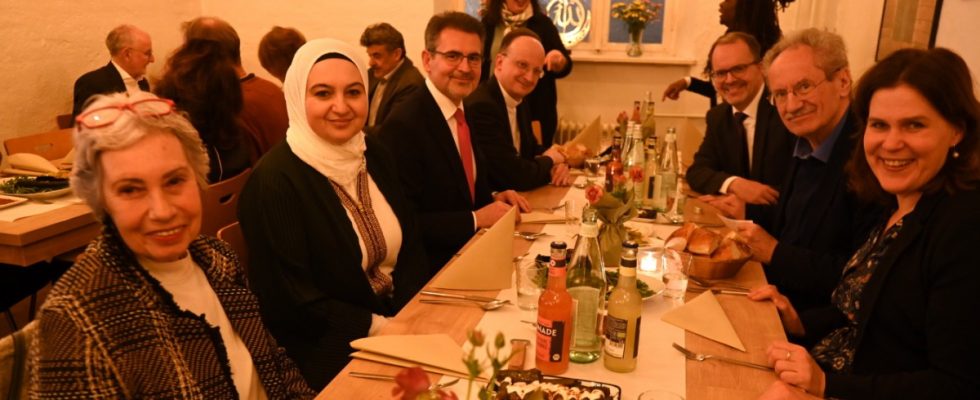6:17 p.m.: We couldn’t do it to the exact minute that the sun set in Munich on Wednesday. During Ramadan, Muslims traditionally break their daily fast with a date – the symbol of purification. This is what they had planned at the Munich Forum for Islam (MFI) and invited high-ranking Christian, Jewish and Orthodox guests as well as politicians from the city and state parliament to the so-called Iftar in their own house on Hotterstrasse. The fact that almost everyone came is already news. Relations with one another have been severely disrupted as a result of the Israel-Palestine conflict – and the need for speech, as it turns out, is considerable. The dates are served half an hour late.
“I don’t know if you’re hungry – we Muslims are.” When Imam Benjamin Idriz, chairman of the liberal MFI association, stands smiling in front of his approximately 100 guests on the first floor of the center shortly before 7 p.m., the signal for the evening has long been set: one after the other, the greeting speakers have made a cautious attempt To mend the breach that emerged with the failure of the interreligious prayer for peace in the Middle East on Marienplatz at the beginning of November. Jews, Christians and Mayor Dieter Reiter (SPD) canceled the event initiated by the Muslims at short notice. This was preceded by accusations from a left-wing alliance that the Muslim Council involved was acting anti-Semitic.
“As people of faith, we are called upon,” says Idriz at the beginning, to counter “hatred and hostility on the street” and, especially in difficult times, to seek dialogue and “to show understanding for each other.” One should not “in this country allow our emotions and our belonging to a certain group to stand in the way of justice towards others”. At the same time, the theologian, who is also the imam of the Penzberg Mosque, demands that action be taken against every form of Islamophobia with the same energetic determination with which anti-Semitic statements are rightly condemned.
“Unfortunately, some threads of conversation have been broken.”
It was not easy for her to accept the invitation to the Iftar, confesses the Jew Eva Haller at the lectern. The President of the European Janusz Korczak Academy takes a deep breath: “October 7th sits very deeply in my soul. It sits very deeply in the soul of the Jewish people.” She came here anyway because, through years of work, she had built up trust and a “tender friendship” with members of the MFI, “we as people with each other.” She hopes “that all of us as a community here, regardless of whether we are Muslims, Jews or Christians, can speak to each other respectfully again.”
Before her, Christoph Klingan, Vicar General of the Archdiocese of Munich and Freising, openly confessed to mutual accusations among Munich’s religious communities as a result of the “endless suffering in the Middle East”https://www.sueddeutsche.de/muenchen/.”Some threads of conversation have unfortunately been broken, for a long time What has grown has been shattered.” But one should not allow terror and hatred to draw one into divisions and resist every form of racism. Breaking the fast together opens up the opportunity for unprejudiced encounters and conversations.
Surprisingly exuberant confession from the mayor
Since the failure of the interreligious peace prayer, the relationship between Muslims and the city’s leaders has also been clouded. Idriz explained in an interview with the SZ that there was no contact for months. All the more astonishing is the exuberant confession from Mayor Verena Dietl (SPD), who is also paying her respects on Wednesday: “From a Munich perspective, the Forum for Islam is an enrichment for the city.” Especially in difficult times, it is important to remain in dialogue. That may also be the reason why so many city councilors line up in the evening.
Markus Rinderspacher (SPD), Vice President of the Bavarian State Parliament, states that everyone who has contacts in both the Jewish and Muslim worlds in Munich is aware of how difficult it is to pick up threads of conversation once they have broken. Former mayor and chairman of the MFI board of trustees Christian Ude makes a demand to those present: “I expect from the religious communities, from everyone, that I can articulate a humane attitude towards war without being immediately reprimanded by one side for not being for it this side takes sides enough.”
Delila Kalebic sings for guests and hosts before they go to the richly laid tables.
(Photo: Stephan Rumpf)
Marian Offman, the city’s commissioner for interreligious dialogue, is one of the few Jews present. Representatives of the Israelite Community and the liberal congregation Beth Shalom did not accept the invitation, says Idriz. “Nevertheless, I believe that today can be a start for us Muslims in Munich.” According to the imam, politicians are “checking that they have to approach Muslims more.”
In order to become more visible, the imam initially calls for more naturalness in mutual interactions and is supported in this by the Protestant regional bishop for Munich and Upper Bavaria, Thomas Prieto Peral. This could also be a festive Ramadan lighting on Munich’s Marienplatz, says Idriz.
“I wish it stayed like it did in Ramadan all year long,” Delila Kalebic sings to the guests at the beginning, before they later sit down at the richly laid Iftar tables one floor down. Most people have already eaten the cleansing date.

